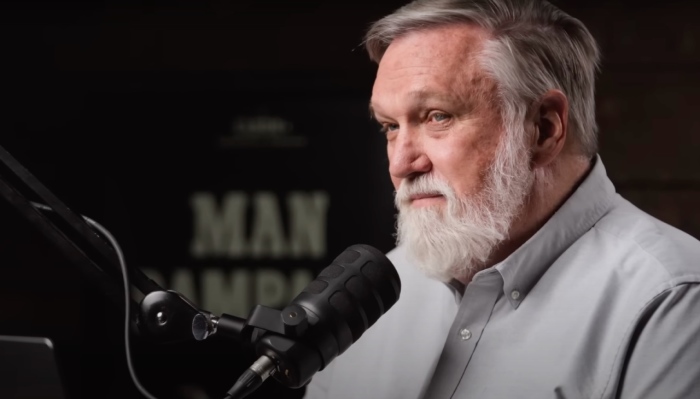
Douglas Wilson, senior pastor of Christ Church (CREC) in Moscow, Idaho, weighed in last week on the recent viral debate between political commentator Tucker Carlson and Sen. Ted Cruz, R-Texas, regarding the Christian duty toward modern Israel.
Wilson, who is Reformed and adheres to a postmillennial eschatology, suggested in a video published last Thursday that the views of both Carlson and Cruz on the issue are “problematic.”
While affirming the historical Reformed position that the Jewish people have a future role to play in the redemptive story, he also noted the complexity of delineating between the Jewish people and the modern political entity of Israel.
“The Bible, taken as a whole, does indicate that there is a role to play for the Jewish people yet to come in Israel,” said Wilson, citing Romans 11.
Wilson noted that such a view has been the traditional Reformed teaching on the issue going back centuries.
“Incidentally, just apart from dispensationalism, this has been the historic Reformed position from the time of the Reformation down. Over and over and over again, Reformed scholars, preachers, theologians have affirmed the future conversion of the Jews, which is a Reformed distinctive,” he said.
Cruz and Carlson went viral earlier this month for their conversation, which at times grew heated, leading to both men raising their voices and exchanging barbs. Carlson grew especially offended when Cruz implied he was antisemitic after he pressed him to clarify his definition of Israel.
“As a Christian, growing up in Sunday school, I was taught from the Bible that those who bless Israel will be blessed, and those who curse Israel will be cursed; I want to be on the blessing side of things,” Cruz said in an apparent reference to Genesis 12:3, though he was unable to cite where it was in the Bible when Carlson asked him.
Carlson also grilled Cruz to explain if God’s promise to Abraham applied to the modern secular nation of Israel with its present borders and political leadership under Israeli Prime Minister Benjamin Netanyahu.
“I think most people understand that line in Genesis to refer to the Jewish people, God’s chosen people,” Carlson said, while Cruz claimed the Abrahamic promise applies to the modern nation-state.
Wilson noted that while the nation of Israel and Netanyahu’s government are not the same, such a debate is “a separate issue” from the debate over Israel’s theological role.
“If you’re supporting the existence of the political entity Israel on the basis of God’s promises in the Old Testament, then you have to deal with the New Testament, which teaches us that the Christian Church is the heir of all God’s promises to Israel. Put it another way, the church is Israel,” he said.
Wilson pushed back against the idea that he is embracing “replacement theology,” which teaches the Church has replaced ethnic Israel as God’s chosen people and the primary recipient of His promises.
“Now some people dismiss that, or accuse that [view] of being ‘replacement theology,’ or the Church replaces Israel. No, it’s Israel coming into full bloom at the day of Pentecost, where the Gentiles are included as the prophet Isaiah foretold that they would be,” he said.
Wilson went on to cite Romans 11, in which “the apostle Paul expressly prophesies, predicts that unbelieving Jews who did not recognize the Messiah and who were cut out of the olive tree — that olive tree being Israel — are going to be grafted back into the olive tree.”
“And the people who are grafted back into the olive tree will be included again in the true Israel of God,” he added.
Wilson concluded that both Cruz and Carlson are at least partially mistaken in their apparent views on Israel.
“To sum up, I would say that Tucker made some points and Ted Cruz made some points; they both have something to say, and Tucker seems to want to say that the verse in Genesis has nothing to do with anybody today, which is problematic,” he said.
“And Ted Cruz appears to want to say that it applies straight across to the people of Israel in the Middle East today, and that’s problematic,” he added, noting that many Jewish people are not Israeli.
Christian Zionism and premillennial dispensationalism have been declining among younger American Evangelicals in recent years, according to multiple surveys detailed in the 2023 book Christian Zionism in the Twenty-First Century: American Evangelical Opinion on Israel.
Experts who spoke to The Christian Post last year offered differing theories regarding the reasons behind such trends, including rising antisemitism or greater access to various versions of Christian eschatology because of the internet.
Wilson, whom Carlson once jokingly dubbed “the Christian nationalist they warned you about,” last month announced the July opening of Christ Kirk Washington, D.C., just blocks from the U.S. Capitol.
Jon Brown is a reporter for The Christian Post. Send news tips to jon.brown@christianpost.com

















